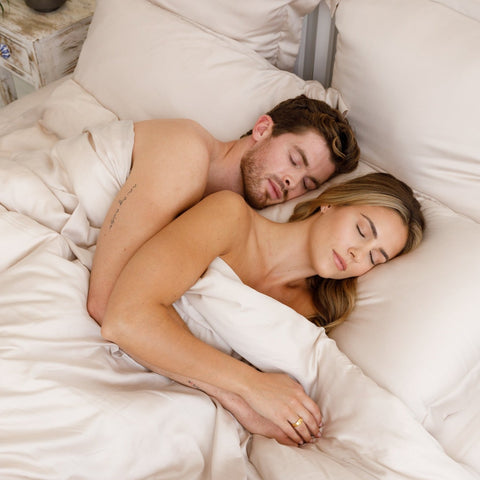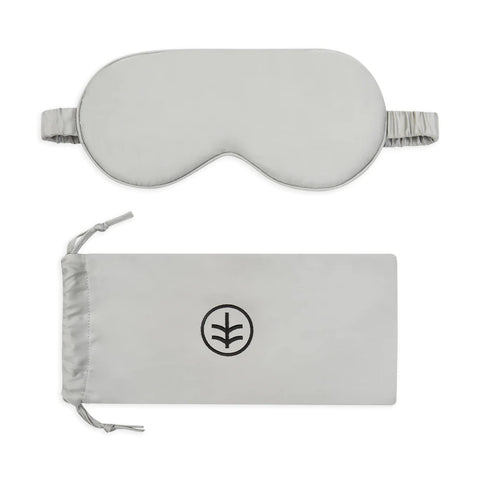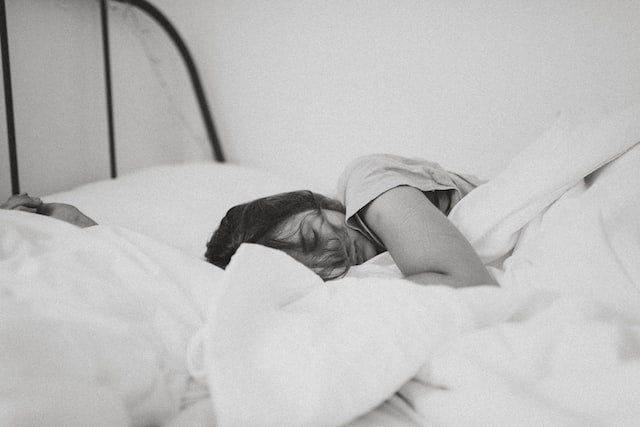When you think of sleep hygiene, you may have thoughts of showering before bed or brushing your teeth at night. But, while these are both typical (and essential) evening tasks, sleep hygiene actually refers to the behavioural and environmental processes you put in place before bed to enjoy a healthy and relaxing night’s sleep. Developing good sleep hygiene habits involves creating consistent routines and an optimal sleep environment that supports both mental and physical wellbeing.
Sleep is so important for our health and happiness. It's when our body can slow down to heal, cleanse and renew itself. So what's the best way to achieve this? Sleep Time x Sleep Quality = Overall Sleep
Table of Contents
- Invest in a comfortable mattress
- Enjoy comfortable bedding
- Try earplugs and eye masks
- Stick to your wake up time
- Nail your morning ritual
- Prioritise sleep
- Don’t make sudden adjustments to your sleep schedule
- Don’t over-nap
- Be consistent in your routine
- Give your body time to unwind
- Avoid electronics before bed
- Dim your bedroom lights
- Avoid tossing and turning
- Get plenty of sunlight
- Stay physically active
- Avoid smoking
- Reduce alcohol consumption
- Cut down on caffeine
- Avoid eating too late
- Only use your bed for sleep
- Set a cool bedroom temperature
- Block out heavy light
- Minimise excess noise
So, without further ado, we’ve explored why sleep hygiene is important, the signs of poor sleep hygiene, and the simple-yet-effective ways you can practice improved sleep hygiene.
Why is sleep hygiene important?
First and foremost, getting a good night’s sleep has both physical and mental health benefits, which helps to improve productivity and alertness when you’re awake.
What are the benefits of good sleep hygiene?
The main importance of strong sleep hygiene is that it can assist your physical and mental health, but what are the specific benefits? In short, improving your sleep hygiene can help in a number of ways:
- Enhanced alertness, focus, and productivity during the day
- Improved mood during work and social activities, with healthy sleep being among the best natural stress remedies
- A strengthened immune system and a decreased risk of serious health issues such as diabetes
- It’s easier to maintain a healthy weight
- Enhanced cognitive skills, including improved memory and comprehension
The signs of poor sleep hygiene
The signs of poor sleep hygiene can be simple to spot, especially if you know what to look out for, with the most obvious indicators being:
- Struggling to fall asleep quickly
- Finding it hard to maintain comfortable sleep
- Experiencing regular disturbances during sleep
- Enduring fatigue and sleepiness during the day
If so, you’re likely suffering from a lack of sleep hygiene. Fortunately, there are some simple fixes to follow that can help you turn around your poor sleep hygiene habits.
How do you practice good sleep hygiene?
Now you know what sleep hygiene actually is and why it’s important, it’s time to explore the ways you can improve your own habits.
Invest in a comfortable mattress
Your sleeping surface is among the most important things when it comes to sleep hygiene. After all, you can follow all the tips on getting to sleep in the world, but if your mattress is uncomfortable you’ll struggle to find a relaxing position. So, take the time to find a mattress that suits your sleeping style, and reap the benefits for years to come.

Try one of the most comfortable, luxurious organic mattresses on the market!
Enjoy comfortable bedding
Just as a comfortable mattress is a bedroom necessity, so are your bed sheets, pillowcases, and duvet covers. They’re the first things you see and touch as you get into bed at night, so make sure you buy bedding that’s both high in quality and extremely relaxing, whether that be Egyptian cotton or ethically sourced eucalyptus silk.
It's the room you spend the most time in, why wouldn't you make it the most luxurious? Most humans spend around 30% of our lives in bed, so make it count.
The best ways to upgrade your bedroom and sleep game is to invest in the best bed sheets. That means comfortable, breathable and beautifully styled. Our bed sheets are made using Eucalyptus TENCEL, so they tick every single box in terms of luxury and function. You honestly won't find better bedding...

Try earplugs and eye masks
Personally, I find it hard to get to sleep because my mind can be overactive from the days events. Or even planning for the next day, week or year! If you're a sleeper who gets woken easily, you could try some ear plugs to block out sound. For an eye mask, we would recommend to try ours! They come in gorgeous patterns, are as soft as silk and share the same health benefits. Both of these items are absolutely essential if you're someone that travels regularly so can't have that perfect routine (but let's face it, who can!).

Silk Eye Mask (Eucalyptus Silk)
£19
Stick to your wake up time

Whether it’s a working weekday or the weekend, it’s useful to try and get into the good sleeping habit of waking up at the same time each morning. This is because an inconsistent and fluctuating sleep schedule can interrupt your internal body clock, and prevent your from enjoying consistently relaxing sleep.
Nail your morning ritual
Seriously? Humans are creatures of habit, and rituals give us that reason to get out of bed in the morning and get the day started without having to engage our brains too much.
Everyone is different but for me it involves a few minutes stretching in bed, then get up and make the bed. Next I have a pint of ice cold water with my vitamins, take the dogs on a short walk to use the toilet and then sit down to plan my day (I usually make a list of 3 top priorities the night before!). I will then usually make a coffee, prepare some simple food and get some ice water ready to start working.
I know all that sounds really simple, but our routines don't need to be complicated. You probably have one already, but maybe factor in something new such as mindfulness for head space, day planning to maximise productivity, or ice water to kick start your metabolism. Everyone is different, so see what works for you!
Prioritise sleep

There are a plethora of reasons you might choose to skip a little sleep, whether it be working late, studying for exams, socialising, or even heading to the gym for a late workout.
However, it’s important not to sacrifice sleep at any cost. If you do find yourself struggling to get your hours in, work out a reasonable target bed time based on when you get up in a morning, and aim to be ready by then.
Don’t make sudden adjustments to your sleep schedule

If you’re trying to improve your sleeping habits, it can actually prove detrimental to do everything at once, and you risk making your internal body clock run even more chaotically. Instead, make small-but-noticeable adjustments each night until you’re properly settled into your new routine.
Don’t over-nap

We all enjoy a nap from time to time, whether it’s to reenergise after a long sports session, recalibrate after a hefty meal, or just as a comfortable way to while away a relaxing weekend in front of the fire. But it’s important not to overdo it, and don’t nap too late on in the day.
Be consistent in your routine

If you’re wondering how to improve sleep hygiene, it’s essential that you stick to a consistent nightly routine. This includes making sure you always put on your pyjamas, brush your teeth, and get under the covers at around the same time each night, to ensure your body clock remains uninterrupted.
Give your body time to unwind

Before going to bed, give yourself sufficient time to properly wind down and relax – especially if you’ve had a busy (and stressful) day or week at work. Work out what calms you down, such as reading or playing soft music, and make it a part of your evening routine.
Avoid electronics before bed

At least 30-40 minutes before bed, aim to put your electronics aside and out of reach. This is because they emit something called blue light that unfortunately reduces your body’s production of melatonin, which disrupts your sleep cycle.
Bedrooms are a restful place, or at least they should be! It's one of the few places in the modern world that you can quite literally 'switch off'. Remove that temptation to stay up reading the news, catching up on emails or flicking through Instagram. If the distractions weren't enough, all LED screens with blue light will inhibit melatonin production as well as disturbing your body's circadian rhythms.
This top tip is a no-brainer... Just switch off and pick up an interesting book to read for 30 minutes before you drift off.
Dim your bedroom lights

If possible, avoid bold, bright lights before bed, as they’re known to hinder the production of melatonin – the hormone that aids sleep. Instead, it can be useful to turn off the main light and opt for a soft-glow bedside lamp.
Avoid tossing and turning

If you find it challenging to fall asleep quickly, and typically toss and turn for what can feel like hours before finally drifting off, you may be better off taking alternative action. Instead of struggling, re-run through your winding down cycle and ensure your body is completely relaxed before trying again.
Get plenty of sunlight

Whether it’s the height of summer or the depths of winter, try to get out and about during the day and ensure you enjoy sufficient sunlight. Daylight exposure is one of the key drivers of a healthy circadian rhythm, and makes getting a good night’s sleep that little bit easier.
Stay physically active

Among the obvious health benefits, keeping physically active can greatly improve sleep hygiene, as well as ensure your body is actually ready to rest by the time bed time arrives.
Avoid smoking

There are a number of reasons why you might want to stop smoking, but you may not know that the nicotine found in cigarettes can actually stimulate your body, heavily disrupt sleep, and even contribute to long-term sleeping problems.
Reduce alcohol consumption

You may find that having a quick drink before bed can make it easier to slip off into a cosy slumber, but what you may not realise is the detrimental impact it often has later in the night. As the effect of the alcohol wears off, you’ll likely find it tougher to enjoy unbroken sleep through till morning.
Cut down on caffeine

Caffeine is a popular stimulant that many of us drink religiously each morning, whether through habit or to perk us up ahead of a busy day. However, it’s important to avoid drinking coffee or tea too late at night, or you’ll suffer from the same alertness that keeps you wired during the day, which is the last thing you need when trying to drift off.
Okay, we accept that caffeine has it's uses and for a lot of us a necessity to function! Quitting caffeine entirely is totally unrealistic for our family given that we LOVE our coffee.
However, caffeine disturbs our internal body clock and circadian rhythm. Even a small dose, when taken less than 6 hours before we sleep has some pretty disruptive effect on sleep. How to increase more deep sleep? We recommend switching to herbal teas for the afternoon and evening - chamomile or peppermint are my favourites!
Avoid eating too late

Enjoying heavy or spicy food late at night can have a negative impact on the quality and comfort of your sleep, as your body will still be digesting the meal by the time you head to bed. Instead, aim to eat your dinner in the early evening, and stick to light snacks late at night.
Only use your bed for sleep
Many of us are in the habit of using our phones, watching TV, or browsing social media in bed before we fall asleep. However, if you’re struggling to enjoy consistently comfortable and uninterrupted sleep, stopping these activities can train your mind to begin to see your bed as solely a place for restful relaxation.
Set a cool bedroom temperature
A cool and comfortable bedroom temperature is essential for great sleep hygiene, complemented by temperature-regulating bedding that keeps you dry during the night.
Block out heavy light

Bold light from outside can be hugely detrimental to the quality of your sleep, so tackle the problem with heavy-set curtains or a comfortable eye mask that keeps everything nice and dark in the small hours.
Minimise excess noise
In the same way that light can have a negative impact on sleep quality, as can noise. If you live in a particularly loud area, and can’t take any action to limit the actual output, try using ear plugs to block out bothersome sounds. However, these aren’t for everyone, so using a fan to drown out a din can be just as useful.
Is sleep hygiene the same for everyone?
In its most basic form, sleep hygiene is the same for everyone. However, of course, not everyone will follow each step in exactly the same way, with some sleepers likely favouring some elements over others.
With this in mind, it may be worth adjusting some steps to work around your own preferences – just remember to make any changes to your sleep schedule gradually.

Does sleep hygiene work?
Improved sleep hygiene can help you to enjoy longer, more comfortable sleep, with the easy-to-adopt steps often a simple fix to some sleeping problems.
However, while its benefits are inarguable, it’s also important to acknowledge that sleep hygiene alone can’t always resolve serious issues and sleeping disorders. In these instances, it’s always recommended to talk to a medical professional.
Hopefully you’re now in a position where you can comfortably improve your own sleep hygiene, and begin to regularly enjoy cosy and uninterrupted sleep. And if you found this article helpful, check out even more helpful insight like this from our sleep experts over on the Ethical Bedding blog, including our guide on how to reduce anxiety at night.




Share:
The Best Ethical Silk Pillowcase - A Buyer's Guide to best Silk Pillowcases
How to Feng Shui Your Bedroom